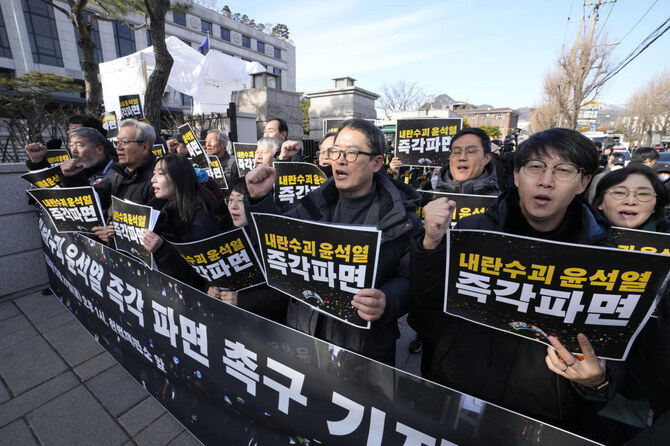WASHINGTON: The Kremlin is turning to unwitting Americans and commercial public relations firms in Russia to spread disinformation about the US presidential race, top intelligence officials said Monday, detailing the latest efforts by America’s adversaries to shape public opinion ahead of the 2024 election.
The warning comes after a tumultuous few weeks in US politics that have forced Russia, Iran and China to revise some of the details of their propaganda playbook. What hasn’t changed, intelligence officials said, is the determination of these nations to seed the Internet with false and incendiary claims about American democracy to undermine faith in the election.
“The American public should know that content that they read online — especially on social media — could be foreign propaganda, even if it appears to be coming from fellow Americans or originating in the United States,” said an official from the Office of the Director of National Intelligence who briefed reporters on condition of anonymity under rules set by the office of the director.
Russia continues to pose the greatest threat when it comes to election disinformation, authorities said, while there are indications that Iran is expanding its efforts and China is proceeding cautiously when it comes to 2024.
Groups linked to the Kremlin are increasingly hiring marketing and communications firms located within Russia to outsource some of the work of creating digital propaganda while also covering their tracks, the officials said during the briefing with reporters.
Two such firms were the subject of new US sanctions announced in March. Authorities say the two Russian companies created fake websites and social media profiles to spread Kremlin disinformation.
The disinformation can focus on the candidates or voting, or on issues that are already the subject of debates in the US, such as immigration, crime or the war in Gaza.
The ultimate goal, however, is to get Americans to spread Russian disinformation without questioning its origin. People are far more likely to trust and repost information that they believe is coming from a domestic source, officials said. Fake websites designed to mimic US news outlets and AI-generated social media profiles are just two methods.
In some cases, Americans and American tech companies and media outlets have willingly amplified and parroted the messages of the Kremlin.
“Foreign influence actors are getting better at hiding their hand, and getting Americans to do it,” said the official, who spoke alongside officials from the FBI and the Department of Homeland Security.
Sen. Mark Warner, the chairman of the Senate Intelligence Committee, said last month that he worries the US may be more vulnerable to foreign disinformation this year than it was before the 2020 election. On Monday he said the warning from intelligence officials shows the US election is “in the bullseye of bad actors across the globe.”
“It also, disturbingly, emphasizes the extent to which foreign actors — and particularly Russia — rely on both unwitting and witting Americans to promote foreign-aligned narratives in the United States,” Warner, a Virginia Democrat, said in a statement.
In one measure of the threat, officials tracking foreign disinformation say they have issued twice the number of warnings to political candidates, government leaders, election offices and others targeted by foreign groups so far in the 2024 election cycle as they did in the 2022 cycle.
Officials won’t disclose how many warnings were issued, or who received them, but said the significant uptick reflects heightened interest in the presidential race by America’s adversaries as well as improved efforts by the government to identify and warn of such threats.
The warnings are given so the targets can take steps to protect themselves and set the record straight if necessary.
Russia and other countries are also quickly pivoting to exploit some of the recent developments in the presidential race, including the attempted assassination of former President Donald Trump as well as President Joe Biden’s decision to drop out of the race in favor of Vice President Kamala Harris.
Following the attack on Trump, for instance, Russian disinformation agencies quickly amplified claims that Democratic rhetoric led to the shooting, or even baseless conspiracy theories suggesting that Biden or the Ukrainian government orchestrated the attempt.
“These pro-Russian voices sought to tie the assassination attempt with Russia’s continuing war against Ukraine,” concluded the Atlantic Council’s Digital Forensic Research Lab, which tracks Russian disinformation.
Intelligence officials have in the past determined that Russian propaganda appeared designed to support Trump, and officials said Monday they have not changed that assessment.
Eroding support for Ukraine remains a top objective of Russian disinformation, and Trump has praised Russian President Vladimir Putin in the past and is seen as less supportive of NATO.
While China mounted a sprawling disinformation campaign before Taiwan’s recent election, the nation has shown much more caution when it comes to the US Beijing may use disinformation to target congressional races or other down-ballot contests in which a candidate has voiced strong opinions on China. But China isn’t expected to try to influence the presidential race, the officials said Monday.
Xie Feng, the Chinese ambassador to the US, said Monday that his government has no intention to interfere with US politics.
Iran, however, has taken a more aggressive posture. Director of National Intelligence Avril Haines said earlier this month that the Iranian government has covertly supported American protests over Israel’s war against Hamas in Gaza. Groups linked to Iran have posed as online activists, encouraged protests and have provided financial support to some protest groups, Haines said.
Iran opposes candidates likely to increase tension with Tehran, officials said. That description fits Trump, whose administration ended a nuclear deal with Iran, reimposed sanctions and ordered the killing of a top Iranian general.
Messages left with representatives from the Russian and Iranian governments were not immediately returned Monday.


























